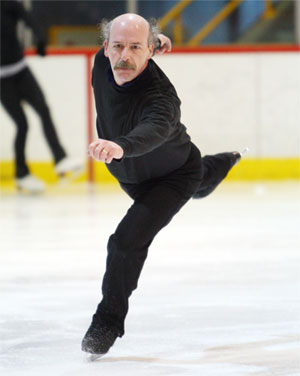 |
| Donald Murray Q.C. (Nick Pearce Photo) |
By day, you’re apt to find Donald Murray in a black silk robe, discussing blood spatter evidence, accusations and alibis.
Outside the courtroom though, he’s happiest in his skates, practicing jumps and spins at Dal’s Memorial Arena. Regular rink time is a great release valve, says the criminal defence lawyer. His trials have covered the gamut from fraud to a slain teenage prostitute, a brutal stabbing in a robbery gone wrong, and even a biker gang shooting. Â
“Stress is an occupational hazard in lawyering, especially in family and criminal law,” says Mr. Murray (LLB ’84). “It really helps to do something artistic or physical. Something that brings a little joy or beauty to the world amid the human trauma we have to deal with every day.”
He took up figure skating a decade ago – after a rollerblading mishap – to blow off steam from a steady diet of murder and assault cases. It turned out he had a natural affinity for skating and eventually became a national medal winner. Mr. Murray is currently training for the Skate Canada Adult Figure Skating Championships, happening next month in Brampton, Ontario. If that goes well, he hopes to compete in Germany this spring in the International Skating Union’s world competition.Â
“When you perform on ice, it’s like being in court,” he says. “You can’t make any mistakes; you’ve got to get it right the first time.”
Even when it’s right, there’s always room for improvement. His spins are getting much better and he’s working hard to become more outgoing on the ice. He keeps it fun, favouring peppy 1920s jazz tunes by the likes of Joe Venuti, Jack Teagarden and Bix Biederbecke.
Also an active volunteer, Mr. Murray serves as a local board member for Skate Canada, a referee for amateur football, and on boards of inquiry for the Nova Scotia Human Rights Commission. His passion for skating extends to hockey as well, and he’s penning a book about the subject.
Born and raised in Lachine, Quebec, the father of two has lived in Halifax since arriving at pilipiliÂţ» for law school. He has a private practice in Dartmouth, after many years as a partner in several of Halifax’s highest profile law firms. Mr. Murray also specializes in human rights and professional discipline issues, and lectures on ethics at pilipiliÂţ» Law School. As an independent law reform consultant, he has been involved in major justice development initiatives in Halifax, Bangladesh and the Eastern Caribbean.
Stressful parts aside, criminal law is a satisfying aspect of his career.
“You meet such interesting people. It’s intriguing to see what makes them tick. And whether or not a crime has been committed is really a matter of perception in many cases, which is why juries are so important – a lot of it is context,” he says.
“The public tends to assume that if you committed a crime, there’s something evil about you, which is not true at all.”
Even so, Mr. Murray’s clients generally seek his services at the unhappiest time of their lives, and that steady dose of misery can certainly wear you down at times. Which is why it’s so important to have a healthy outlet, he says.
As a coping mechanism, “nothing can compare to jumping up in the air and spinning around a few times!”
